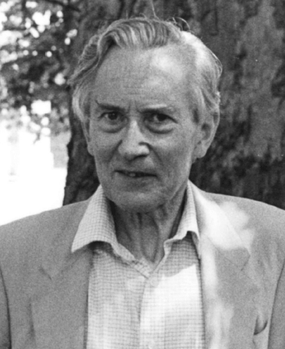Malcolm Pasley facts for kids
Quick facts for kids
Sir
Malcolm Pasley
Bt, FBA
|
|
|---|---|
 |
|
| Born | 5 April 1926 Rajkot, India
|
| Died | 4 March 2004 (aged 77) Oxford, England
|
| Nationality | British |
| Alma mater | Trinity College, Oxford |
| Known for | Leading authority on German literature, particularly Kafka |
| Spouse(s) | Virginia Killigrew née Wait (m. 1965) |
| Children | 2 |
| Awards | Baronet Cross of Honour for Learning and the Arts (Austria) |
| Scientific career | |
| Fields | German literature and philology |
| Institutions | |
Sir John Malcolm Sabine Pasley (born April 5, 1926 – died March 4, 2004), also known as Malcolm Pasley, was an important British expert in German literature and philology. Philology is the study of language in historical and cultural context.
At University of Oxford, Pasley became the top expert of his time on German literature. He was especially famous for his hard work in publishing the writings of Franz Kafka, a well-known author.
Contents
Sir Malcolm Pasley's Life Story
His Early Years and Education
Malcolm Pasley was born in Rajkot, British India. His father, Sir Rodney Pasley, was a school headmaster. Malcolm was the only son.
He went to Sherborne School in England. After school, he joined the Royal Navy and served from 1944 to 1946.
Later, he went to Trinity College, Oxford, to study Modern Languages. He graduated with top honors in 1949.
Becoming a German Literature Expert
After college, Pasley decided to work in academics. He became a lecturer in German at Oxford University in 1950.
He taught at Brasenose and Magdalen. In 1958, he became a Fellow at Magdalen College, Oxford. This meant he was a senior member of the college.
Pasley was very interested in the writer Franz Kafka and his books. He quickly became a leading expert in editing Kafka's writings.
The Kafka Manuscripts Journey
In 1961, Pasley was given a very important task. He had to collect Kafka's original handwritten papers from a bank vault in Switzerland.
He carefully drove them by car all the way from Switzerland to Oxford. He then placed them safely in the Bodleian Library. This library became the main place for studying Kafka's texts.
Pasley became the Vice-President of Magdalen College for a year in 1979. In 1983, he was chosen to be a member of the Deutsche Akademie für Sprache und Dichtung, which is the German Academy for Language and Literature. He retired from his academic work in 1986.
Awards and Recognitions
National Honors
- 1982: Became a Baronet. This is a special British honor passed down through families.
- 1987: Received the Cross of Honour for Learning and the Arts, 1st Class from Austria. This is a high award for achievements in science and art.
Academic Awards
- 1983: Became an Academician in the German Academy for Language and Literature.
- 1986: Received an honorary PhD from Giessen University in Germany.
- 1988: Became a Fellow of the Chartered Institute of Linguists.
- 1991: Became a Fellow of the British Academy. This is a very high honor for experts in humanities and social sciences.
Sir Malcolm's Important Work
Pasley wrote about many German authors. His early studies of the German language, especially about Friedrich Nietzsche, made him very well-known.
His book, Germany: A Companion to German Studies, was first published in 1972. It is still a very popular book today.
His Dedication to Franz Kafka
Pasley is most famous for his deep study of Kafka's writings. He started studying Kafka early in his career.
He became friends with Marianne Steiner, Kafka's niece. Through this friendship, Pasley became the main advisor to Kafka's family. He thought of Kafka as "a younger brother."
In 1956, Kafka's works were put in a Swiss bank vault for safety. After much discussion, Pasley personally took possession of Kafka's papers. In 1961, he drove them from Switzerland to Oxford. He later said this adventure "made his own hair stand on end."
Most of the papers were placed in Oxford's Bodleian Library. However, Kafka's famous book The Trial stayed with Max Brod's heir. In 1988, the German Literary Archives bought the manuscript of The Trial for a lot of money.
At Oxford, Pasley led a team of scholars. They worked to put Kafka's texts back together, removing changes made by others. They started publishing these restored works in 1982. This team made sure the original German text was complete, paying close attention to Kafka's unique punctuation.
Debates About Kafka's Works
After the Kafka works were published, some people criticized whether they were truly complete. A publisher named Stroemfeld Verlag asked to scan the original papers. They wanted to make a copy that looked exactly like the originals. They also worried about the papers fading and crumbling.
Pasley refused their requests. Marianne Steiner, Kafka's niece, also refused. She said she didn't want them to have anything to do with the manuscripts.
In 1998, Stroemfeld published a copy of The Trial. Since the German government owned this manuscript, they could access it. This publication showed the original handwritten pages next to the typed text.
Some scholars, like Jeremy Adler and Louis Begley, supported the Stroemfeld editions.
His Family Life
In 1965, Malcolm Pasley married Virginia Wait. They had two sons:
- Sir Robert Killigrew Sabine Pasley, born in 1965.
- Humphrey Sabine Pasley, born in 1967.
Sir Malcolm was also a patron of the Paisley Family History Society for several years.
See also
- Pasley baronets
Sources
| Baronetage of Great Britain | ||
|---|---|---|
| Preceded by Sir Rodney Marshall Sabine Pasley 4th Bt |
Baronet (of Craig)''' 1982–2004 |
Succeeded by Sir Robert Killigrew Sabine Pasley 6th Bt |
 | Laphonza Butler |
 | Daisy Bates |
 | Elizabeth Piper Ensley |

